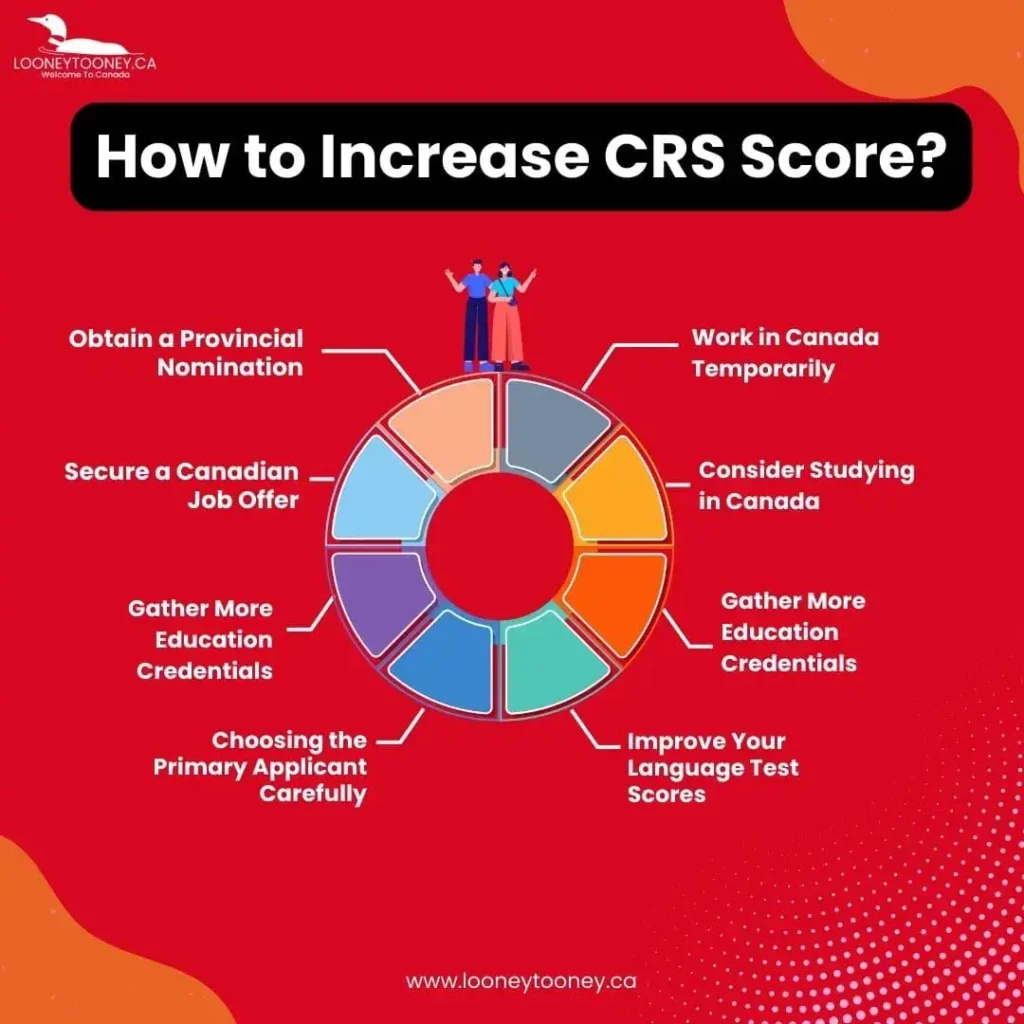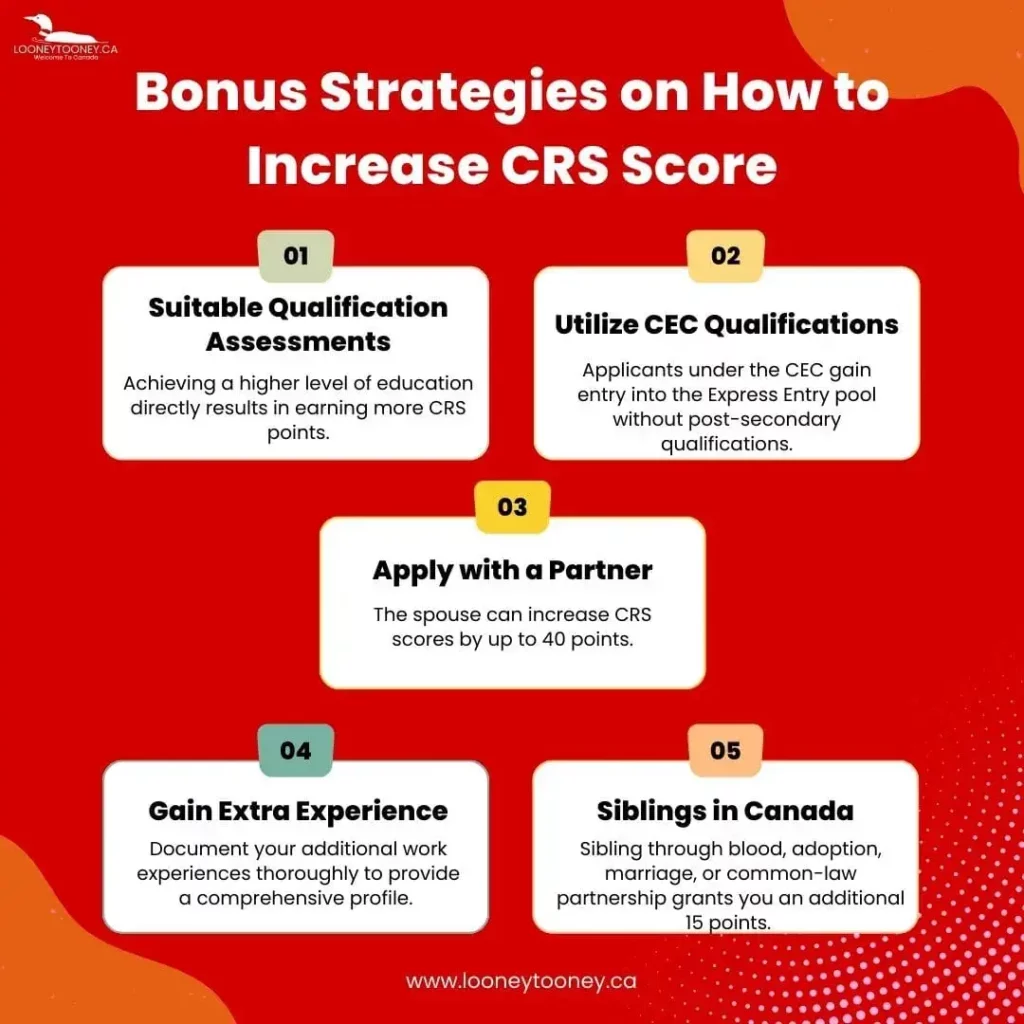“How to increase CRS score” is a question on the minds of many aspiring immigrants to Canada through the Express Entry system. Obtaining a Permanent Residency (PR) in Canada is a dream for many, and achieving a competitive CRS score is a critical step in making that dream a reality. In this comprehensive guide, we will explore strategies on how to increase CRS score and improve your chances of receiving an Invitation to Apply for Canadian PR.
Table of Contents
- What is the Comprehensive Ranking System (CRS)?
- How to Increase CRS Score: Strategies to Improve Score for Express Entry
- Bonus Strategies on How to Increase CRS Score
- What’s the breakdown of CRS Scores?
- Conclusion: Achieving Your Canadian Dream – How to Increase CRS Score
- FAQs on How to Increase CRS Score
What is the Comprehensive Ranking System (CRS)?
The Comprehensive Ranking System (CRS) is a points-based mechanism employed by the Government of Canada to evaluate your eligibility for the Express Entry immigration program. When you submit your Express Entry profile, the government computes your profile’s score, which is subsequently utilized to rank your application. This system is utilized to assess various aspects of your qualifications, including:
- Skills
- Education
- Language proficiency
- Work experience
- Other relevant factors
The Comprehensive Ranking System is applied in multiple immigration pathways under Express Entry. These pathways include the Federal Skilled Worker (FSW) program, the Federal Skilled Trades Program (FSTP), and the Canadian Experience Class (CEC) program. Furthermore, various Provincial Nominee Programs (PNPs) also rely on the CRS to evaluate applications received through their respective Express Entry.
How to Increase CRS Score: Strategies to Improve Score for Express Entry to Canada
Securing permanent residence in Canada through the Express Entry system often requires a competitive CRS score. To enhance your CRS score and improve your chances of receiving an Invitation to Apply (ITA) for permanent residence, consider the following strategies:

1. Secure a Canadian Job Offer
Securing a job offer from a Canadian employer can significantly boost your CRS score by up to 200 points, greatly enhancing your chances of receiving an Invitation to Apply (ITA) for permanent residence. To increase your prospects, consider networking with Canadian professionals, exploring job opportunities on online portals, and participating in virtual job fairs. Target industries and regions where there is a high demand for your skills to improve your chances of receiving a job offer.
2. Obtain a Provincial Nomination
Obtaining a Provincial Nomination through a Provincial Nominee Program Express Entry stream can substantially enhance your CRS score. Each province has unique requirements and nominee streams, so it’s crucial to research and identify the province that best aligns with your qualifications and career goals. Stay vigilant about updates in provincial nomination programs, as eligibility criteria can change over time.
3. Work in Canada Temporarily
Working in Canada temporarily with a valid work permit, even for a limited time, can add 40 points to your CRS score. Research work permits and industries with high job demand to secure temporary employment. Leverage your Canadian work experience to build a professional network for future opportunities.
Studying in Canada on a study permit can make you eligible for a Post-Graduation Work Permit (PGWP). Unlike some other routes, PGWP doesn’t require a job offer, making it easier for newcomers. The PGWP duration is usually tied to your study program length. A longer PGWP duration can provide you with more time to gain valuable Canadian work experience.
4. Consider Studying in Canada
Generally, newcomers opt to pursue higher education in Canada with a study permit for a few years before seeking permanent residence. Earning a Canadian education credential can grant you 15 to 30 CRS points, significantly improving your prospects for PR eligibility down the road. Additionally, look into scholarship opportunities to help with the costs of studying in Canada.
5. Gather More Education Credentials
You can enhance your CRS score by pursuing further education in your home country. If you already hold an undergraduate degree, obtaining a master’s degree can contribute 15 points to your CRS score. However, it’s crucial to carefully assess this option to ensure that you don’t gain education points at the cost of age points.
6. Improve Your Language Test Scores
Enhancing your language test scores is a straightforward yet effective way to elevate your CRS score. Consider investing in language courses and practice tests to boost your language proficiency and confidence. Explore language classes tailored specifically to the IELTS or CELPIP exams to maximize your performance.
7. Choosing the Primary Applicant Carefully
If you are applying as a couple, carefully select the primary applicant. The primary applicant’s qualifications have a more significant impact on your CRS score. To maximize your points, use the CRS score calculator to compare your scores and make an informed decision about the primary applicant. Remember that once you submit your profile, you cannot change the primary applicant, so choose wisely.
8. Maximize Foreign Work Experience
Maintain a comprehensive record of your foreign work experience, including duties, achievements, and references. Consider obtaining reference letters from previous employers to strengthen your application.
Bonus Strategies on How to Increase CRS Score
While the primary strategies outlined above can significantly boost your CRS score, there are additional tactics you can employ to further enhance your chances of receiving an Invitation to Apply for permanent residence in Canada. These bonus strategies encompass a range of options to fine-tune your Express Entry profile and increase your overall competitiveness. Explore these additional approaches to ensure you have a well-rounded strategy for success.

1. Suitable Qualification Assessments
Achieving a higher level of education directly results in earning more CRS points. Nonetheless, remember that qualifications obtained outside Canada need to undergo an Educational Credential Assessment (ECA) for validation. Candidates can pursue undergraduate (UG) or postgraduate (PG) courses while in the Express Entry pool. A Bachelor’s degree, for instance, can contribute up to 170 additional points to the overall score.
2. Utilize CEC Qualifications
Applicants under the Canadian Experience Class (CEC) gain entry into the Express Entry pool without the necessity of post-secondary qualifications. Nevertheless, the inclusion of such qualifications in a CEC candidate’s profile can boost their overall score.
3. Apply with a Partner
Experience or qualifications in certain trades can yield higher scores than spouses with advanced degrees or expertise in fields with ample professionals in Canada. This is noteworthy for provinces with high-demand job categories. Age is crucial; carefully select the best principal applicant. The spouse can also increase CRS scores by up to 40 points through improved Canadian work experience, education, or language skills. Provincial programs offer more points for qualified spouses.
4. Gain Extra Experience
Document your additional work experiences thoroughly to provide a comprehensive profile. Stay informed about specific job opportunities and requirements in provinces of interest.
5. Siblings in Canada
Having a sibling in Canada who is a Canadian citizen or permanent resident can enhance your chances of success. In fact, having a sibling through blood, adoption, marriage, or common-law partnership grants you an additional 15 points. However, you must be able to provide proof of your relationship, such as a birth certificate.
Note: If you don’t meet the Express Entry requirements, you might still have the option to apply through Canada’s family sponsorship program.
These strategies offer a comprehensive approach to increasing your CRS score for Express Entry to Canada, providing you with a well-rounded understanding of the steps needed to improve your chances of securing permanent residence.
What’s the breakdown of CRS Scores?
The following tables outline the point allocation for each factor in the Comprehensive Ranking System that Express Entry candidates can receive.
| Factors | Maximum Points |
| Core / Human Capital Factors | 460 (with spouse) and 500 (without spouse) |
| Spouse or Common-Law Factors | 40 |
| Skill Transferability Factors | 100 |
| Additional Points | 600 |
| Maximum Total Points | 1200 |
Conclusion: Achieving Your Canadian Dream – How to Increase CRS Score
Attaining a high CRS score is essential for turning your dream of becoming a Canadian permanent resident into a reality. It’s a journey that involves careful planning, continuous effort, and strategic decision-making.
By following the strategies outlined in this guide and staying informed about the latest updates in immigration policies, you can significantly enhance your CRS score and increase your chances of receiving the ITA. Remember, the path to Canadian PR may be challenging, but with determination and the right approach, it can become a reality.
FAQs on How to Increase CRS Score
In this section, we will address common questions related to “How to increase CRS score for Express Entry and Secure PR” in Canada. Explore these frequently asked questions for valuable insights into optimizing your Express Entry profile and improving your chances of achieving PR.
Q. How do I get higher CRS score?
A. To increase your CRS score, aim to enhance language skills, secure a Canadian job offer, obtain a provincial nomination, maximize skill transferability, gain Canadian work experience, utilize age points, improve second language skills, validate foreign qualifications, and stay updated on immigration news.
Q. How to increase CRS score by 15 points?
A. To increase your CRS score by 15 points, consider improving language proficiency through language tests, pursuing additional education, enhancing skills in a second official language, or gaining more Canadian work experience.
Q. Is it possible to obtain Canadian PR with a low CRS score?
A. If your CRS score falls below 400 points and you aren’t receiving an Invitation to Apply for Canada PR, you have the option to apply through a Provincial Nominee Program (PNP).
Q. What should I do if my CRS score still falls below the cutoff?
A. Even if your CRS score falls below the cutoff, your Express Entry profile remains active for a year, providing an opportunity for potential qualification. Additionally, you can explore other immigration programs not reliant on CRS scores.
Q. What is a Provincial Nomination Program, and how can it enhance my CRS score?
A. Provincial Nomination Programs (PNPs) enable provinces and territories in Canada to nominate individuals for PR based on their specific criteria. Obtaining a provincial nomination through a PNP Express Entry stream can significantly enhance your CRS score by awarding you 600 additional points.
Don’t miss out on:
- Latest Express Entry Draw 2023: New Rounds of Invitations
- SINP Latest Draw 2023 | View Cutoff Score & ITA’s Issued
- Guide on Different Types of Temporary Visas in Canada
- Spouse Open Work Permit Canada
We hope that this comprehensive guide on “How to Increase CRS Score” has equipped you with valuable insights to navigate your path toward Canadian immigration success. If you are eager to explore further into the world of Canadian Immigration, your journey doesn’t end here. Visit LooneyTooney.ca for an exciting dive into the most recent updates and expert perspectives.





